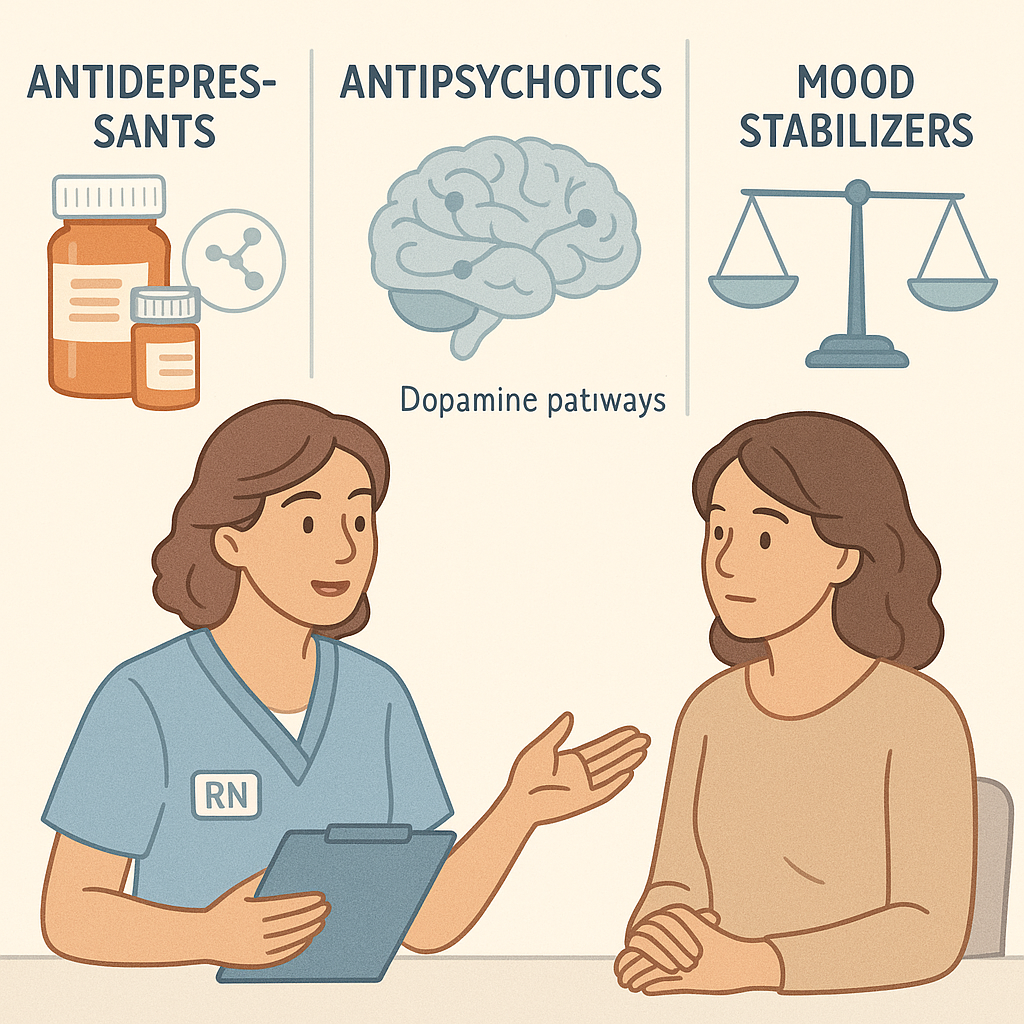Every nurse must understand mental health medications. This topic shows up on almost every NCLEX exam and is a must-have in any nursing bundle. Whether you’re a new RN nurse or a seasoned registered nurse, this quick guide will help you remember key facts about antidepressants, antipsychotics, and mood stabilizers — plus what to watch for in patient care.
📌 Why Mental Health Meds Matter in Nursing
Mental health conditions like depression, schizophrenia, and bipolar disorder can’t be managed by therapy alone. Instead, medications help balance brain chemicals so patients can think clearly, manage emotions, and live healthier lives.
As a registered nurse, you’re responsible for giving these medications safely, monitoring side effects, and educating patients on how to take them properly. Moreover, understanding how these drugs work allows you to recognize early signs of toxicity or complications — which is crucial for both the NCLEX and real-life nursing care.
🧠 1️⃣ Antidepressants
Use: Treat depression, anxiety, PTSD, and OCD.
✅ SSRIs (Selective Serotonin Reuptake Inhibitors)
Examples: Fluoxetine (Prozac), Sertraline (Zoloft), Escitalopram (Lexapro)
Key points: Fewer side effects than older drugs; however, they take 4–6 weeks to show results.
Side effects: Nausea, insomnia, and sexual problems. Watch closely for serotonin syndrome.
✅ SNRIs (Serotonin-Norepinephrine Reuptake Inhibitors)
Examples: Venlafaxine (Effexor), Duloxetine (Cymbalta)
In addition, these are effective for patients with depression and chronic pain. However, they share similar warnings as SSRIs.
✅ Tricyclic Antidepressants (TCAs)
Examples: Amitriptyline, Nortriptyline
Key points: These drugs are effective but have more side effects, including dry mouth, sedation, and cardiac issues. As a result, overdose risk is higher.
✅ MAOIs (Monoamine Oxidase Inhibitors)
Examples: Phenelzine (Nardil), Tranylcypromine (Parnate)
However, these are rarely used due to dangerous food interactions. Patients must avoid aged cheese, wine, and cured meats to prevent a hypertensive crisis.
📝 NCLEX Tip: Know serotonin syndrome signs — confusion, high blood pressure, fever, and tremors. Furthermore, always teach patients to report these immediately.
🧠 2️⃣ Antipsychotics
Use: Treat schizophrenia, bipolar mania, and severe agitation.
✅ Typical (First Generation)
Examples: Haloperidol (Haldol), Chlorpromazine (Thorazine)
Key points: These target positive symptoms like hallucinations and delusions. However, they can cause EPS (extrapyramidal symptoms) such as tremors, rigidity, and tardive dyskinesia.
Watch out for neuroleptic malignant syndrome (NMS) — a rare but fatal emergency.
✅ Atypical (Second Generation)
Examples: Risperidone (Risperdal), Olanzapine (Zyprexa), Clozapine (Clozaril)
Additionally, these treat both positive and negative symptoms and have fewer movement side effects. On the other hand, they increase the risk of weight gain, diabetes, and sedation.
Clozapine requires WBC monitoring because of the risk of agranulocytosis.
📝 NCLEX Tip: Recognize NMS symptoms — high fever, muscle rigidity, and confusion. Respond immediately; this is a medical emergency.
🧠 3️⃣ Mood Stabilizers
Use: Manage bipolar disorder, especially manic episodes.
✅ Lithium
Key points: Classic and effective mood stabilizer.
Check levels: 0.6–1.2 mEq/L — toxicity occurs above this range.
Toxicity signs: Tremor, confusion, vomiting, and diarrhea.
Therefore, monitor closely and educate patients to maintain steady salt intake and hydration. Avoid dehydration, as it increases toxicity risk.
✅ Anticonvulsants (Used as Mood Stabilizers)
Examples: Valproic acid (Depakote), Carbamazepine (Tegretol), Lamotrigine (Lamictal)
These drugs, in addition to mood stabilization, also help manage seizures.
However, they may cause liver problems, low platelets, or a rash.
Lamotrigine, specifically, can cause Stevens-Johnson Syndrome, a life-threatening skin reaction.
📝 NCLEX Tip: For Lithium, monitor kidney function, electrolytes, and toxicity signs carefully. Furthermore, reinforce patient teaching at every dose adjustment.
📚 Nursing Bundle Cheat Sheet: Quick Dos & Don’ts
✅ DO:
- Always double-check drug interactions.
- Additionally, educate patients about side effects and when to seek help.
- Monitor vital signs and lab levels regularly.
- Stay alert for suicide risk, especially during the first few weeks of antidepressant therapy.
❌ DON’T:
- Stop medications suddenly — taper as directed.
- Ignore patient complaints of tremors, fever, or sudden mood changes.
- Overlook diet restrictions for MAOIs or Lithium, as they can be fatal.
✅ Key Takeaway
Mental health medications can save lives — but only if administered safely. By understanding the basics of antidepressants, antipsychotics, and mood stabilizers, you’ll improve patient safety and confidence in your role as an RN nurse. Moreover, this knowledge strengthens your NCLEX readiness and enhances your nursing bundle for mental health success.

